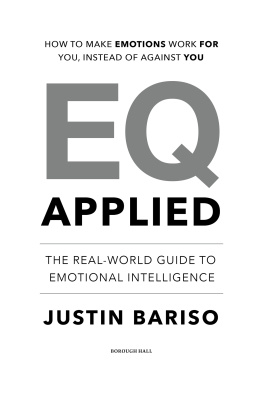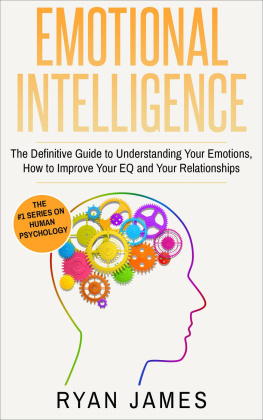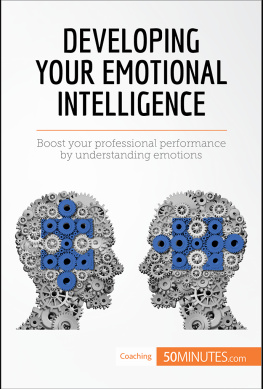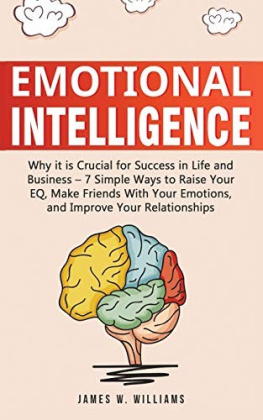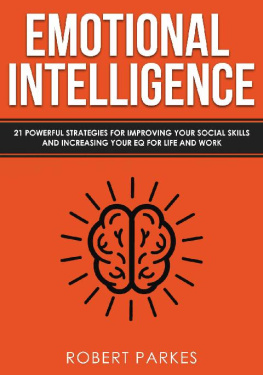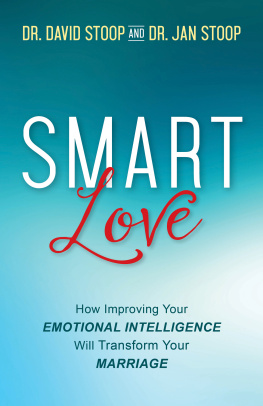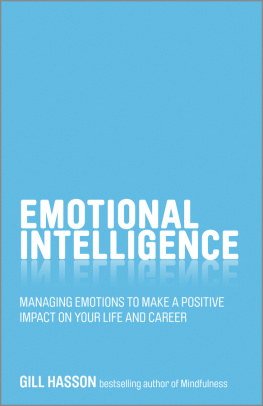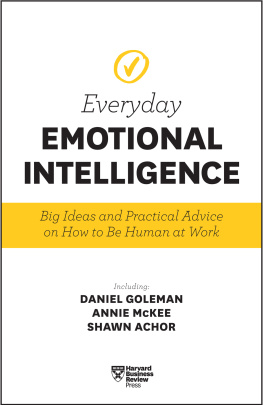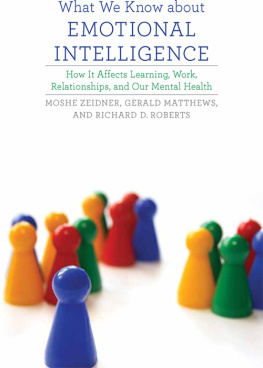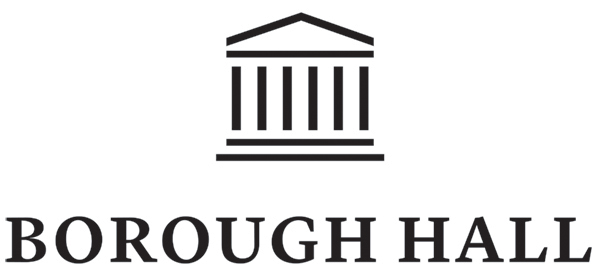All rights reserved. No part of this book may be reproduced, stored in a retrieval system or transmitted, in any form or by any means, without the prior written consent of the publisher, except in the case of brief quotations, embodied in reviews and articles.
This book is not intended as a substitute for the medical advice of physicians. The reader should regularly consult a physician in matters relating to his/her health and particularly with respect to any symptoms that may require diagnosis or medical attention.
In some instances names and identifying characteristics have been changed to protect the privacy of the individuals involved.
Introduction
I n 1995 , psychologist and science journalist Daniel Goleman published a book introducing most of the world to the nascent concept of emotional intelligence. The ideathat our ability to understand and manage emotions greatly increases our chances of successquickly took off, and it went on to greatly influence the way people think about emotions and human behavior.
In the twenty-plus years since Golemans book burst onto the scene, the world has changed dramatically, and the need for emotional intelligence has only intensified.
Consider that a fractured political climate is now the norm, with candidates using emotions like fear and anger as weapons of mass persuasion. Passionate followersquick to judge the other as stupid or incorrigiblepursue heated discourse and hurl ad hominem attacks, making calm and rational discussion all but impossible.
War, globalization, and increasing urbanization continue to push people of different races, cultures, and backgrounds into closer proximity. Rich and poor become neighbors in overpopulated cities. In some countries, refugee camps have sprung up in firmly established neighborhoods. But unfamiliarity breeds fear, and these differences fuel suspicion and worry.
The internet has put an immense amount of information at our fingertips. But as news travels at lightning speed, its more difficult than ever to tell fact from fiction. The result? An era of post-truth, where appeals to emotion and personal belief have become more influential than objective facts.
The proliferation of smartphones and mobile devices has replaced brief moments of observation and self-reflection with constant reading and responding to messages, checking of social media feeds, or simply browsing the internetactions spurred on by feelings of anxiety, boredom, and fear of missing out. The ability to communicate with practically anyone, at any time, inspires us to overshare in an emotional moment, revealing sensitive information we later regret.
As this Pavlovian addiction to our devices destroys our self-control, it simultaneously diminishes our ability to think for ourselves. The websites we frequent play a major role in shaping our emotions; the stories we read, the news we consume, the videos we watch all shape our moods and thoughts, slowly molding our opinions and ideologieswithout us even realizing it.
Consider also that as the world has evolved, so has our understanding of emotional intelligence.
When the term was first proposed, many considered emotional intelligence inherently virtuous. Proponents touted it as the end-all solution to various problems, from bullying at school to weak employee engagement. But its become evident that, like traditional intelligence, this tool can be used for both ethical and unethical purposes. For example, researchers have demonstrated how some people with high emotional intelligence use their skills to selfishly influence or manipulate others.
But building your own emotional intelligence can help you identify and combat these attempts. By increasing your knowledge about emotions and how they work, youll be able to better understand yourselfand the reasons behind the decisions you make. This will enable you to devise strategies that will proactively shape your emotional reactions, to avoid saying and doing things you will later regret, and to motivate yourself to act when necessary. Eventually, youll learn to use emotions to help others as well, creating deeper and more meaningful relationships in the process.
These are just some of the reasons why we need emotional intelligence today more than ever.
To guide us into the topic, well explore the following questions:
How can you transform your strongest emotions from a destructive force to a power for good?
How can asking the right questions and expanding your emotional vocabulary help you become more self-aware?
Why is it so difficult to cultivate self-control? How can you improve your ability to do so?
How can knowledge about the brain and the way it works help you shape your emotional habits?
How can you get the most from the feedback you receive, whether positive or negative?
How can you deliver feedback in a way that benefits others?
How can empathy help you, and how can it hurt you?
How can you be more persuasive or influence others in a positive way?
How can emotional intelligence help you cultivateand maintaindeeper, more meaningful relationships?
How can you protect yourself from the people who use the principles of persuasion and influence to harm or manipulate you or others?
Ill use a combination of fascinating research and real-life stories to provide practical answers to these questions. Ill also get personal, explaining how emotional intelligence taught me to lead, and also how it taught me to follow. Ill relate how the ability to understand and reach others emotionally helped me to woo my wife and made me a better husband and father. But Ill also detail the dangers I encountered along the way and show why working to increase and apply your emotional intelligence quotientyour EQ is only one piece of the puzzle to becoming the best version of yourself.
The final goal is simple: I want to help you make emotions work for you, instead of against you.
1
From Theory to Practice
What Real-World Emotional Intelligence Looks Like
The emotions of man are stirred more
quickly than mans intelligence.
Oscar Wilde
I n 1997 , Steve Jobs returned to Apple, the company he cofounded, and proceeded to lead one of the most remarkable turnarounds in history. As CEO , he brought Apple back from the brink of bankruptcy, aiding its transformation into the most valuable company on the planet.
All of this success is even more impressive when we consider that, just twelve years earlier, Jobs was forced out of the company he helped build.
Jobs had a reputation as brilliant and inspiringbut he was also known to be overbearing, impatient, and petulant. Circumstances had eventually become so difficult between him and Apples board of directors that the group stripped him of major responsibilities and rendered him nearly powerless. Jobs, feeling betrayed, left the company and founded a new start-up named Ne XT .
Notably, a number of high-ranking Apple employees followed their former boss to his new company. At the time, Jobs was a cocky, thirty-one-year-old multimillionaire who was almost always convinced he was right. He was harsh and demanding, and he could be very demeaning. So why would this group of sharp, focused individuals leave secure positions to continue working with him?

